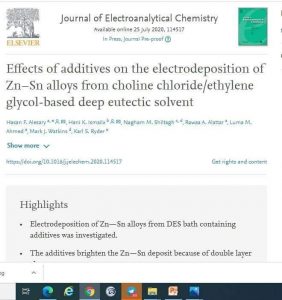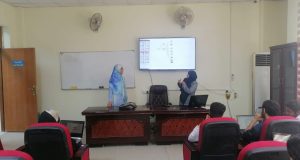Dr. Hassan Faisal Nemea Al-Yessari, a lecturer at the Faculty of Science at the University of Kerbala, has published a scientific paper entitled ” Effects of additives on the electrodeposition of Zn-Sn alloys from choline chloride / ethylene glycol-based deep eutectic solvent”
The research has been published jointly with researchers from the University of Ulster, Prof. Cal Ryder and Dr. Mark in the Journal of Electroanalytical Chemistry (Elsevier) Q1. The journal is registered within Scopes containers. The journal, which is issued from the Netherlands,
The study aims at showing how to implement the idea applications in coating metal structures for cars, airplanes and other metal parts to protect them from corrosion and give them a lustrous shape.
The study deals with the electroplating work of zinc-tin alloys (Zn-Sn) on copper metal from an auxiliary ionic solvent prepared from choline chloride with ethylene glycol (Ethaline 200) in a molar ratio (2: 1) and with the presence of additives of nicotinic acid, ammonium chloride and boric acid.
The study improves the physical and mechanical properties of the zinc-tin layer deposited on the surface of the copper compared to the coating obtained from solutions that do not contain additives.
It examines the electrical properties of the plating fluid using cyclic voltammetry, the surface properties of the coating such as crystal structure and surface components by SEM / EDX, and studied the topography and surface roughness using the AFM technique. As for XRD, it is used to study the crystalline structure of the (Zn-Sn) layer, as well as to study the corrosion resistance of the coating in a saline medium using the technique of Tafel and Empedens.
The study has found that the cost of using electric current during the coating process from these ionic auxiliary liquids is very small, because the amount of hydrogen released on the surface of the cathode is small compared to the coating from aqueous solutions. Also, the ethylene is non-toxic, easy to prepare and has a high solubility of metal salts, and the zinc-tin alloy coating has high corrosion resistance and high hardness against shocks.

 University of Kerbala
University of Kerbala
































































